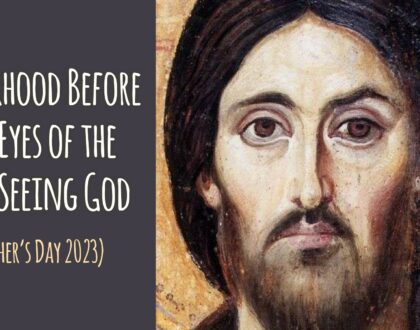“Why Not Rather Be Defrauded?”

by Pastor Gene
In reading through the Gospels, it’s virtually impossible to miss the compassion of Jesus. It’s everywhere on display. It’s what drove Him to seek the lost, provide for their needs, heal their illnesses and urge them to Himself that they might be saved.
The lesson of Jesus’ compassion was not lost on the early church. They drew it into their very lungs as though it were oxygen. Compassion became their identity. It’s what they were known for.
Aristides was a second-century Christian philosopher who lived at Athens and addressed a famous Apology to the Roman emperor Antoninus Pius. This is the way he described believers of that day:
“They abstain from all impurity, in the hope of the recompense that is to come in another world. As for their servants or handmaids or children, they persuade them to become Christians by the love they have for them; and when they have become so, they call them without distinction, brothers.
They do not worship strange gods; and they walk in all humility and kindness and falsehood is not found among them and they love one another. When they see the stranger, they bring him to their homes and rejoice over him as over a true brother; for they do not call brothers those who are after the flesh, but those who are in the Spirit and in God.
And if there is among them a man that is poor and needy and if they have not an abundance of necessities, they fast two or three days that they may supply the needy with the necessary food. They observe scrupulously the commandment of their Messiah; they live honestly and soberly as the Lord their God commanded them” (The Apology of Aristides, c. 138-161).
What Are We Known For?
There’s a sense here that the privilege of showing the heart of Christ to their neighbors – His love, compassion and mercy – was more important to the early Church than even eating. This recalls Job, who famously declared, “I have esteemed the words of [God’s] mouth more than my necessary food!” These early believers were so serious about this that they became known for it.
This is a very different way of looking at life than we’re used to, right? We usually understand a generous person to be one who is liberal with what is left after his or her own needs have been met. But that’s not the way the early followers of Jesus understood it. They gave out of their poverty.
They’d heard of the compassion that drove their Lord – how “when He saw the crowds, He had compassion for them.” He saw them as “harassed and helpless, like sheep without a shepherd.” And He appealed to His followers to “pray earnestly to the Lord of the harvest to send out laborers into His harvest” (Matthew 9:35-38).
Compassion had driven their Master and compassion should drive them too. They looked at their persecutors not as enemies to be conquered, but as the lost who needed to be saved.
They knew that Jesus promised a blessing to “those who are persecuted for righteousness’ sake.” “Theirs,” He said, “is the kingdom of heaven.” Then He added, “Blessed are you when others revile you and persecute you and utter all kinds of evil against you falsely on my account. Rejoice and be glad, for your reward is great in heaven, for so they persecuted the prophets who were before you” (Matthew 5:10-12).
These believers were most certainly persecuted, and yet they rejoiced! Remember the Apostles who, after being arrested, went away from the Sanhedrin “rejoicing that they had been counted worthy to suffer dishonor for the Name” (Acts 5:41)?
The compassion I’m talking about is a compassion that’s born in the New Man – one who’s been reconciled to God and has received a ministry of reconciling others to Him as well. This mindset is supernatural; only God can affect such things within our hearts. For, as Paul wrote, “If anyone is in Christ, he is a new creation. The old has passed away; behold, the new has come. All this is from God, who through Christ reconciled us to himself and gave us the ministry of reconciliation” (2 Corinthians 5:17-18).
“Why Not Rather Suffer Wrong?”
This kind of BIG Jesus/little me thinking is on display in 1 Corinthians 6. It was a strange situation. One believer had apparently defrauded another believer and the offended brother sought relief from the secular courts. Paul was incensed! He just couldn’t believe it! Did they think so little of the souls of the lost in their midst that they’d jeopardize the testimony of the church because of money?
So, he wrote: “If you have such cases, why do you lay them before those who have no standing in the church? I say this to your shame. Can it be that there is no one among you wise enough to settle a dispute between the brothers, but brother goes to law against brother, and that before unbelievers? … Why not rather suffer wrong? Why not rather be defrauded?” (1 Corinthians 6:4-7)
Now THAT’S radical! Paul is essentially saying, ‘I’d be swindled every day of the week before I’d drag my brother into court before unbelievers!’
Now, why would he say such a thing? He certainly wasn’t advocating injustice (he’d encouraged them to seek out believers who could resolve the issue in a righteous way, 1 Corinthians 6:5). But Paul understood that first and foremost he was a laborer in the Lord’s harvest. And his own personal interests were far less important than the far greater goals of glorifying God and gathering in the elect.
“All … all … all … some”
So, in another place he says, “To the weak I became weak, that I might win the weak. I have become all things to all people, that by all means I might save some. I do it all for the sake of the gospel, that I may share with them in its blessings” (1 Corinthians 9:22).
Did you get that last part? Paul knows the glory of the gospel and the eternal life it promises. And he wants to “share” those blessings with all he meets (although he’s realistic enough to know that only “some” will receive it). But, to him, the ‘good news’ of seeing a sinner come to repentance far outweighed any wrong he might suffer personally along the way.
May the great goal of ‘showing Jesus’ to others overshadow any other goal we might have – especially those that put a BIG-me at its center.
To consider …
- I’ve always found studying the early Church to be both encouraging and challenging. While certainly imperfect, these early believers received the teachings of Jesus with a seriousness that seems lacking today.
Take another look at the quote from The Apology of Aristides above. Considering his description of these early believers, how do you think today’s Christians fare? Are we falling short? Measuring up? Doing better? In what areas, specifically? Why do you think this might be?
How have believers today been affected by the godlessness of modern culture?
How have you been affected by the times in which you live? Is there a permissiveness in your life that would have been (and should be) unthinkable among the early believers?
Notice also the inside-out heart transformation that seems to have characterized these Jesus-followers. Be honest: is your life more characterized by small me/BIG God or small God/BIG me thinking?
- Consider the question Paul posed to the believers at Corinth: “Why not rather suffer wrong? Why not rather be defrauded?”
How precious is the reputation of the Christian brotherhood to you?
Are you cognizant that you are publicly bearing God’s image to those around you? Marking territory for Jesus? Seeking to make Him famous? That is, after all, the mindset of BIG-God/small-me.
Does showing something of Jesus to those around you mean enough to you that you’d let it cost you something? Would you allow your self to be swindled? Defrauded? Taken advantage of, if it meant preserving the public testimony of the faith?
I find it fascinating that the things described in The Apology of Aristides were the things the church were known for. What is it known for today? Is it a valid or unfair criticism?
- These early believers had clearly absorbed the teachings of Jesus deeply into their lives and were changed by them. In a sense, they went out into the world as ‘little Jesuses’ – showing all around them what He was like through their love, compassion, care and sacrifice.
How should this challenge us as the Body of Christ?
How should it challenge us personally?
Recommended Posts

Reflection Questions: Fatherhood Before the Eyes of the All-Seeing God (Father’s Day 2024)
June 16, 2024
Comments
Comments are closed.



I am so grateful for the conviction of that quote by Aristides. I pray that it will ignite a fire of determination and spark a sense of urgency in me. A willingness to not only “count the cost” but to pay it with great joy. Even when I don’t see any results! Pastor G, this blog was perhaps the best one I’ve read. Thank you for putting yourself second and Jesus first, daily. We are a most blessed local assembly and therefore an extremely accountable one. May we not shrink back at but instead eagerly anticipate His appearing!!